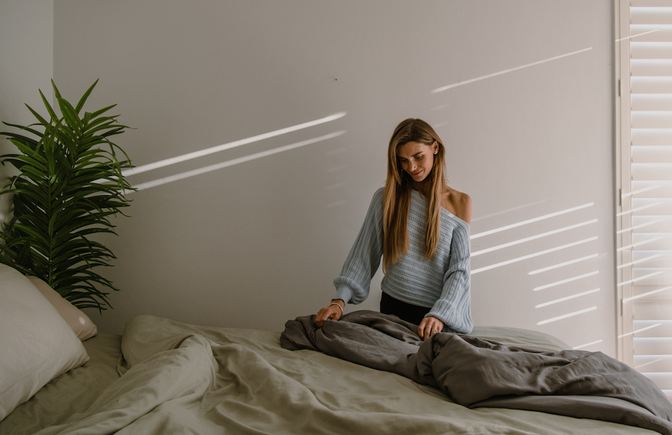And how you can get better-quality sleep.

There’s a good chance you fall into one of the two following categories: You’re someone who sets one alarm for the morning and gets up right away, or you set six alarms and hit snooze endlessly, getting out of bed at the last possible moment before you’ll be late for work. If you’re in the latter category, it might be because of your internal body clock.
Doctor David Cunnington, a Harvard-trained, Melbourne-based specialist sleep physician at SleepHub with more than 25 years experience, says it’s common to set multiple alarms.
“The median body-clock length for people is 24 hours and 17 minutes, so when the alarm goes off 24 hours after the time it went previously, your internal clock is thinking, ‘Hang on, I’m not ready for that yet’,” says Dr Cunnington. “So there’s that sense of needing to hit snooze two, three or more times.”
This is less of a problem for “morning people”, who naturally feel more energetic and productive during the day due to factors such as genetics and lifestyle.
“People who are naturally early-morning types have a body-clock length that’s much closer to 24 hours. When the alarm goes, their body is much more ready to wake up,” says Dr Cunnington. “This [body-clock length] only applies to the minority of the population. It’s far more common for people to have a body-clock length a little longer than 24 hours.”
Aside from your body clock, Dr Cunnington says a number of factors impacting sleep can lead to trouble waking up in the morning.
“There might be something going on that’s impacting on sleep quality or quantity, which means they’re not waking up in the way they should,” he explains. “Maybe they’re not looking after their physical or mental health, they’re not getting enough sleep or something is impacting on sleep quality, like sleep apnoea [when your airway gets blocked during sleep] or problems with insomnia where the brain isn’t switching off well.”
Many of us are guilty of hitting snooze repeatedly in the morning or setting 10 alarms in quick succession to help us wake up – is there a way to break this cycle? Dr Cunnington says you’re better off setting a later alarm for less disruption while you sleep.
“People who know they’re not going to wake up early often set constant rolling alarms that they just keep hitting again and again,” he says. “Doing this just means they’re going to lose what could have been an hour of good quality, undisturbed sleep.”
Dr Cunnington says some of the best ways to get a good night’s rest (and wake up on time) are to take care of your physical and mental health, wind down before bed and try to get to sleep at a reasonable hour. All of these things help keep your circadian rhythm – the body’s sleep-wake cycle – consistent.
“Be realistic about when you’re ready to get up. Don’t set your alarm for an aspirational time that you know is never going to happen,” he advises. “It’s important to take a step back, work out what type of person you are and try to work with your body clock rather than against it.”
Dr Cunnington says technological improvements in the future could make waking up easier. “A better solution than what we currently have available would be something nonintrusive to wear during the night,” he says. “This could measure our brainwave activity, determine when it’s coming close to the time for us to be naturally waking and give us gentle prompts. That technology isn’t here just yet, but it’s not far away.”
More tips on the best ways to fall asleep here.
Photography: Jiwon Kim



